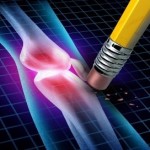Active with Arthritis

Do you run, jog or regularly take part in sport?
Do you spend hours in front of a computer?
Do you have an injury?
Are you overweight?
If the answer is yes to at least one of the above and you notice pain, stiffness or swelling in any of your joints, don’t ignore it as they could be inflamed. Inflammation can lead to arthritis, a very painful condition affecting around 10 million people in the UK. The most common form is osteoarthritis which occurs when there is damage to the bone and cartilage; in severe cases it can make everyday mobility a real challenge. There are a number of contributory factors including poor nutrition, malabsorption, injury, repetitive work or exercise, general wear and tear, post-menopause or any combination.
Contrary to common belief, arthritis isn’t just one of the conditions we might suffer from as we get older. It can affect anyone at any age and is one of the body’s warning signs that something isn’t quite right. Early symptoms are stiffness that progress to pain, loss of flexibility, joint deformity and a decreasing ability to remain active.
Spot the signs:
- Early morning joint stiffness
- Joint pain and swelling
- Increased pain during prolonged activity which is relieved by rest
- Injury
A GP will usually prescribe non-steroid anti-inflammatory drugs (NSAIDS) which have the nasty side effect of gastric irritation. Kinesiology looks at the root cause to establish exactly what is triggering the inflammation. It could be liver toxicity, dietary issues, acidity within the joints or the entire lot! Certain foods may set off a cascade of chemical reactions which fuel the inflammation, potentially leading to arthritis.
Anyone suffering from joint pain, stiffness or arthritis will benefit from a personalised programme, but my general tips below should really help with the symptoms.
Kath’s tips to take care of your joints
- Avoid the deadly ‘nightshade’ foods. These are potatoes, tomatoes, peppers, aubergines and the tobacco plant. Interesting article here. They contain the toxin Alpha-Solanine which has been linked to joint pain and inflammation.
- Eat foods rich in Omega 3 and 6 oils. Foods such as oily fish (salmon, mackerel and sardines), seeds (flaxseed, pumpkin and chia), nuts (walnuts, almonds and pecans) and herbs (basil, oregano and marjoram) contain essential fatty acids that are vital in producing and repairing connective tissue. They also play a key role in reducing inflammation.
- Magnesium is incredibly important as it helps to alleviate tightness in the muscles and maintain the pH balance in the tissues around your joints. You will absorb this in your Friday Epsom Bath Salts night. Take a supplement if you already have arthritis and eat plenty of green leafy vegetables.
- Eat foods rich in Zinc. Pumpkin seeds are particularly good as a natural anti-inflammatory.
- Eat sulphur-rich foods such as eggs, onions, garlic and leeks. You could also take an MSM supplement.
- Taking Glucosamine can also help. I recommend Everflex.
- Drink plenty of water! It’s important to keep well hydrated.
- Avoid fizzy drinks, caffeine, alcohol and gluten.
- Try to avoid acidic foods such as refined sugars and carbohydrates. You can test the pH balance of your body using litmus papers first thing in the morning. These are available from most health stores.
- Pilates, swimming or cycling are amongst the best non-traumatic knee-strengthening exercises if you have arthritis in your knee.
